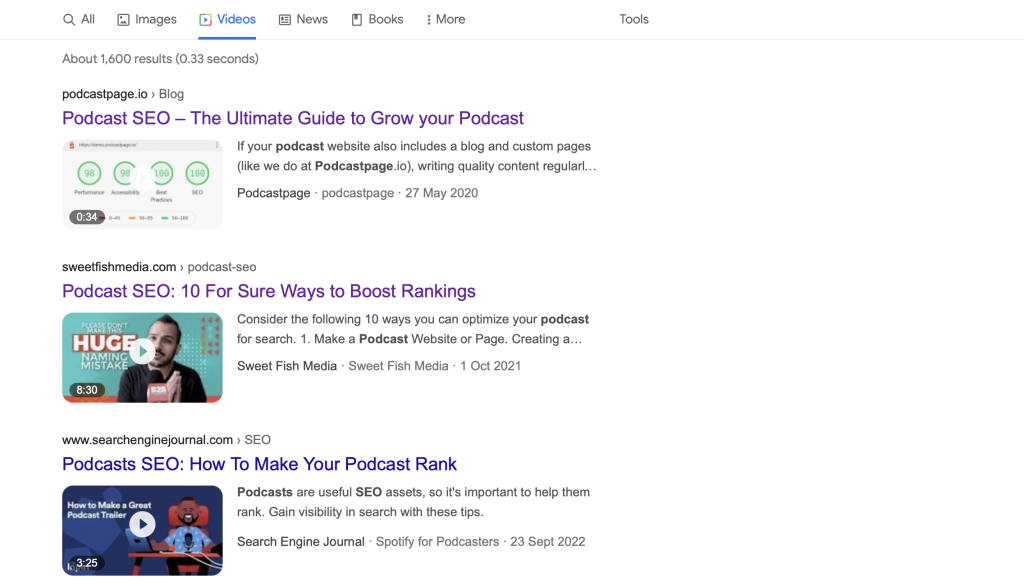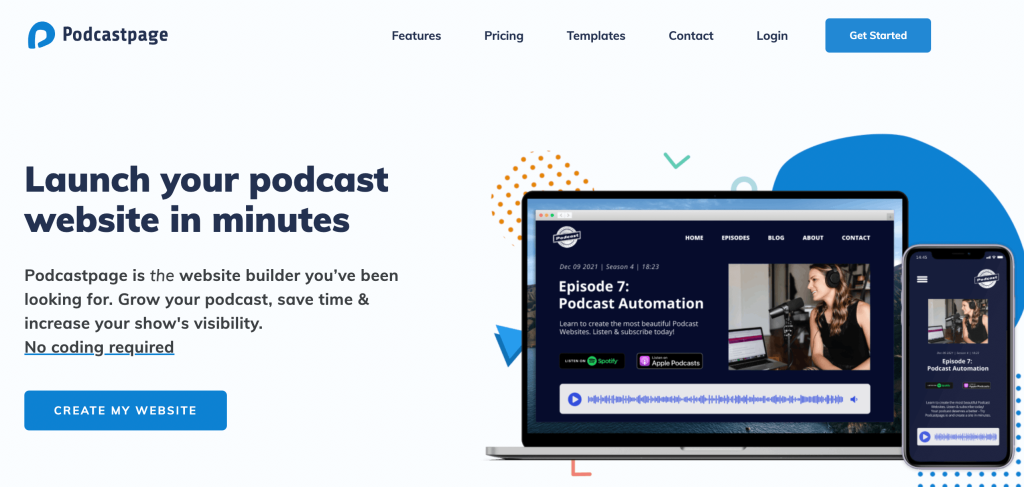Starting a podcast can be a great way to build a community, explore your interests, and generate income. However, even after you record great and captivating episodes, your chances of success are slim if users can’t find your show. All the hard work of planning, recording, producing, editing and publishing the podcast comes down to finding people who’d be interested to listen to it.
Fortunately, you can improve your podcast Search Engine Optimization (SEO) to boost your search rankings. By using optimization techniques, your podcast should be more visible in the search results, which enables you to gain more listeners.
When we talk about SEO, this only refers to searches for your podcast, brand, or name on search engines. That being said, there’s an entire world of optimizing your content for the podcast platforms as well. We wrote a more extensive guide about Podcast SEO that includes both of these worlds.
In this post, we’ll take a closer look at SEO for your podcast. Then, we’ll explore five key tips for improving your podcast SEO. Let’s get started!
An Overview of SEO for Your Podcast
SEO involves improving your search visibility by employing certain strategies. When you use these techniques correctly, search engines can better understand your content and match it to a user’s search intent. Then, they might rank it higher on their search results pages.
For example, when you enter “Podcast SEO” into a search engine, you’ll be presented with websites, images, and videos that are optimized for those keywords:

By climbing up the search engine rankings, your podcast will be more visible, making it easier to drive traffic to your show. Plus, with podcast SEO, you can utilize both text and audio SEO techniques.
Furthermore, since Google launched its own podcast platform, people can find and play your podcast directly within their browsers. Then, you can reach listeners that don’t yet know about your show.
How to Improve Your Podcast SEO (5 Tips)
Now that you understand a bit more about podcast SEO, let’s look at five tips to boost your search rankings!
1. Make a Podcast Website
It’s a great idea to create a website for your podcast. Once you do that, you’ll have a dedicated space for your content and complete control over optimizing your site for search engines.
Plus, you can set up a blog on your website, providing more opportunities to rank for specific search terms. We’ll explain more about this in the next section!
Better yet, with a website, you can find more opportunities to optimize your podcast for search engines. For instance, you might attach your own domains, create individual posts and pages for your episodes, and take steps to improve loading times.
Without a website, you’ll have to rely on podcast directories to do the work for you – while your podcast will definitely be featured on Spotify or Apple Podcasts, nothing guarantees that it’ll bring enough listeners, and that people would be able to easily find it.
Fortunately, it’s easy to create a podcast website with a podcast website builder like Podcastpage:

Our tool enables you to build your site visually without coding or design experience. Moreover, you’ll get built-in podcast features like a custom audio player, automated episode timestamps, and an easy-to-use episode importer.
Beyond SEO, a website can help you in many different aspects – it’ll bring more ways of communication with your listeners, build a brand around your show, and share more types of content. We wrote a full article about why you absolutely need a podcast website here.
2. Insert Keywords in Prime Locations
Keywords are search terms that people use to find content online. For example, you might type “how to create a website” into Google. A website can use this key phrase within its content to get matched with users who are looking for this specific information.
With a good SEO strategy, you can show Google that your content matches a user’s search intent. Therefore, Google knows that if it sends visitors your way, they’re likely to find value. In return, you may be rewarded with higher search rankings, helping more users discover your website.
To get started, you can use a tool such as Google Keyword Planner to find relevant keywords.
You can target popular keywords, but these can be difficult to rank for (especially against authoritative sources). Instead, it can be helpful to focus on long-tail keywords, which have multiple words within the phrase. These have a lower search volume, but because they’re more specific, you increase your chances of ranking for them.
Then, you’re able to optimize different sections of your site by including your keywords. For example, you can insert these terms within your episode title, podcast description, transcript, show notes, and meta description.
Additionally, you might publish blog posts for each episode –

You can cover the same topics but present them in a written format. Therefore, you’ll gain an extra location for your keywords!
3. Create Individual Pages for Your Episodes
With your own Podcastpage website, you can easily set up separate pages for each episode. This way, all of your episodes will have their own domains on your site:

Often, with hosting services, you’re forced into publishing your episodes on the host’s domain. Therefore, even if you publish keyword-optimized content, it only contributes to the hosting service’s ranking.
However, every page you create on your website can help you rank better on Google. This is especially relevant if each page targets new keywords, has a proper title, and contains optimized show notes and transcripts.
Better yet, with separate pages for each of your episodes and blog posts, you can start linking between pages.
Building links between your content is great for SEO. Plus, it encourages users to explore other areas of your site, keeping them on your site for longer.
4. Master “Technical SEO”
To get your website show well-structured results on searches, and help search engines “understand” what your website is about – a lot of small technical improvements are needed behind the scenes (to the source code of your website).
If you’re using Podcastpage, you have nothing to worry about because it’s all fully optimized from the get-go for a perfect SEO score. If you’re using another platform –
- Make sure you have <meta> tags for all of your pages.
- Add a <link rel=”alternate”> tag that points to your podcast RSS feed.
- Include open graph and detailed schema data on all of your pages for better indexing and sharing.
- Make sure your website is using valid HTML code.
- Test that your website load relatively fast as slow speeds would impact your SEO score.
5. Leverage Social Media
We’ve already mentioned that you can repurpose your podcast content as blog posts. However, you might also use your episodes within social media posts. This is an easy (and free) way to promote your podcast.
Additionally, promoting your show on social media can drive more traffic to your site and help you build an online presence:

However, when posting on social media, it’s important to focus on providing value for your followers. Rather than simply asking users to check out your new episode, offering a sneak preview or sharing a helpful tip can be better.
One of the stand-out features of Podcastpage is that you can share your episodes directly on social platforms. Our website builder is optimized for all the popular channels, including Facebook, Twitter, and Instagram. Therefore, your posts will be the correct size, and your podcast title, description, and artwork will be clearly visible.
Conclusion
To grow your listener-base, you’ll need to use SEO techniques for your podcast. Otherwise, it will be difficult for users to discover your episodes. Fortunately, you can improve your podcast SEO and expand your reach and search rankings.
To recap, here are five tips to improve your podcast SEO:
- Make a podcast website with Podcastpage.
- Insert keywords in prime locations.
- Create separate pages for your episodes.
- Make sure your website meets common “technical-SEO” requirements.
- Leverage social media.
The easiest way to improve your podcast SEO is to create a dedicated podcast website. Podcastpage is a flexible, beginner-friendly tool that comes with a ton of SEO features. For instance, you can attach your domains, post automatic tweets for each new episode, and create a blog. Get started with Podcastpage today!



